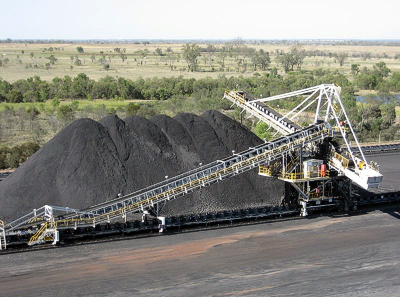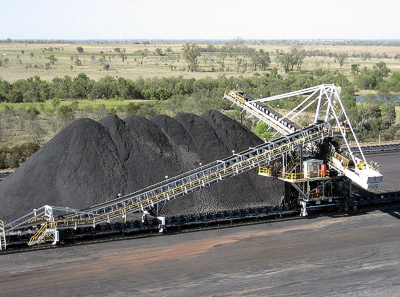You know who else thinks the coal industry is doomed? The coal industry.
ThinkProgress’ Stephen Lacey yesterday shared the story of BHP Billiton, an Australian mining firm that extracts, among other things, coal. But BHP doesn’t see a great future in the stuff.

A coal mine in Queensland.
Lacey quotes from the Australian Financial Review, which spoke with BHP exec Marcus Randolph about an export terminal on the coast of the country.
“As we see more cyclone-related events … the vulnerability of one of these facilities to a cyclone is quite high,” [Randolph] said. “So we built a model saying this is how we see this impacting what the economics would be and used that with our board of directors to rebuild the facility to be more durable to climate change.”
Cyclone is to hurricane as Foster’s is to beer — Australian version of the same, but not really.
“In a carbon constrained world where energy coal is the biggest contributor to a carbon problem, how do you think this is going to evolve over a 30- to 40-year time horizon? You’d have to look at that and say on balance, I suspect, the usage of thermal coal is going to decline. And frankly it should.” …
“We’ve been cautious in our energy coal investments,” Mr Randolph said. “There are a couple of reasons for that: the cloudy future, the general return on investment that is available in the industry and there are some structural reasons why it is the way it is. And it is also the availability of better returns on other projects that exist in the broader [BHP] portfolio.”
Can you imagine? Can you imagine Murray Energy’s Robert Murray or Massey’s Don Blankenship saying anything even remotely like this? While BHP’s Randolph recognizes the realities and constraints imposed on the coal industry by environment and economics, American coal CEOs are weaving the same old webs.
Of course, BHP faces a different economic scenario than do companies in the U.S. Australia recently instituted a carbon tax that increases the cost of high carbon-producing energy systems like coal, though only modestly for now. While not an easy political move, a carbon tax is much easier to implement in a country that insists on responsible reporting when it comes to climate science.
A free market should naturally result in admissions like BHP’s. The costs of coal consumption are higher than the value in burning it. In America, the market has a heavy, coal-dusted thumb holding it down.



